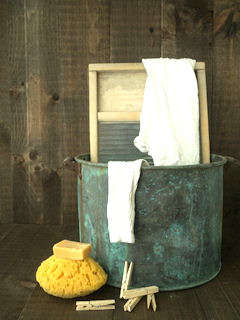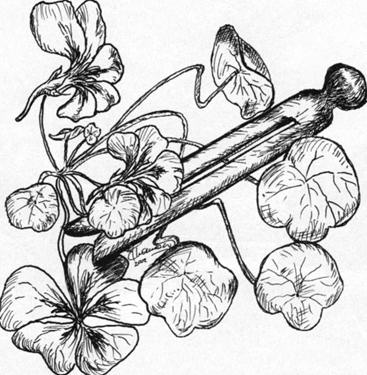Tubthumpers
Eleanor Thomson recalls the washhouse warriors of yesteryear
 Up until the widespread advent of affordable, labour-saving washing machines in the 1960s, the most strenuous and well planned operation carried out by housewives every week with military precision and muscular effort took place on designated wash days. For that was when bed linen, clothing, curtains and a whole multitude of household materials had to be hand washed since commercial laundries were expensive luxuries where too often clothes could be ruined by rough treatment (I remember my mother's dismay on one occasion when she had decided to use the laundry and unwrapped the brown paper and string of her parcel on her return, only to find the sheets in shreds - and there was no compensation in those days).
Up until the widespread advent of affordable, labour-saving washing machines in the 1960s, the most strenuous and well planned operation carried out by housewives every week with military precision and muscular effort took place on designated wash days. For that was when bed linen, clothing, curtains and a whole multitude of household materials had to be hand washed since commercial laundries were expensive luxuries where too often clothes could be ruined by rough treatment (I remember my mother's dismay on one occasion when she had decided to use the laundry and unwrapped the brown paper and string of her parcel on her return, only to find the sheets in shreds - and there was no compensation in those days).
It was heavy work lifting sopping wet clothes in and out of the sink; and sometimes illness prevented women from participating in this watery wrestling match.
The war of the washtubs was always hard fought. In 1950s Alexandria in the Vale of Leven when I was a growing girl, I remember one woman in particular who always looked each wash day like a combatant in some gladiatorial domestic conflict. Each Monday morning she would emerge, striding out from her tenement flat, clad in black Wellington boots and a vast red rubber apron, with her hair tied inside a colourful headscarf and her sleeves rolled up so that her chubby forearms were bared to the elbow. She obviously meant business.
Yet, strangely enough, she seemed quite content and kept up a constant humming, like the proverbial busy bee, as she marched out to the back court washhouse, a small brick building containing two deep jawstanes' (stone sinks), cold water taps, a mangle for wringing the clothes and a huge zinc-lined tub, beneath which was a small furnace used to heat the water shared by all the tenement dwellers.
Woe betide anyone who used the washhouse when it was not 'their day' - especially if it was sunny!
Often husbands helped out by filling the boiler with water and then lighting the fire below before they went to work for the water took hours to heat up.
When the washing was finished boiling, the scalding hot items were extracted using a wooden stick and large wooden pincers and then heaved into one of the deep sinks, rinsed and battered with the dolly stick before being fed through the wringer into the other, adjoining sink.
Women needed to be strong in those days: but a little help from neighbours and 'a good gossip' while working away sometimes made it a social occasion as well. Seeing the washing strung out on ropes between the poles and dancing in the breeze on warm days, like the multi-coloured sails of a fleet of ships, must have given the women a tremendous sense of satisfaction. After all, there was very little room to dry clothing indoors - the kitchen pulley could only hold so much.
Dry, windy days were cherished; while changeable weather was dreaded as frustrating and irritating with women spending half their time looking up at the clouds and dashing out to haul in the flapping laundry at the first dollops of rain.
 Seeing any nasturtiums in the summer sun recalls to me a flower-filled border outside our washhouse more than 50 years ago. Someone must have taken delicate care to cultivate it as nasturtiums and pansies colourfully proliferated.
Seeing any nasturtiums in the summer sun recalls to me a flower-filled border outside our washhouse more than 50 years ago. Someone must have taken delicate care to cultivate it as nasturtiums and pansies colourfully proliferated.
I remember a neighbour patiently answering my persistent questions about the strange orange flowers with the large seedpods, round flat leaves and peculiar odour. When she offered me a leaf to nibble, my trepidation turned to delight as my tongue was nipped by the delicate peppery taste.
Another find in the wee flower bed was a wooden clothes peg. This became for a while my armless 'dolly' as the peg was topped with a round wooden point like a human head and sliced up the middle like two legs.
On rainy days during the summer holidays when the washhouse was empty, it was a deliciously creepy place for us kids. There was no electric lighting and dark shadows loomed in the gloom. A good place to play hide-and-seek. And the dolly sticks made good swords while round wooden lids were perfect shields.
Sunny days meant we were out playing in the back greens, climbing the poles and swinging on the ropes. One harassed housewife, who had spent hours slaving away in the washhouse, chased us for our lives when she saw our muddy hands slapping her sheets aside and our grubby bodies getting wound inside her pegged-out laundry as we chased each other through the crowded lines. We were reported to our mothers and suitably chastised.
In comparison to the stalwarts of yesteryear, we are now weaklings when it comes to keeping our clothes clean. Just think of that other world, not that long ago, the world of set wash days and heavy labouring, the next time you press the button on your washing machine and programme it to quickly and efficiently churn your clothes spotless. The women of half a century ago could not have envisaged such luxury. (2002)

